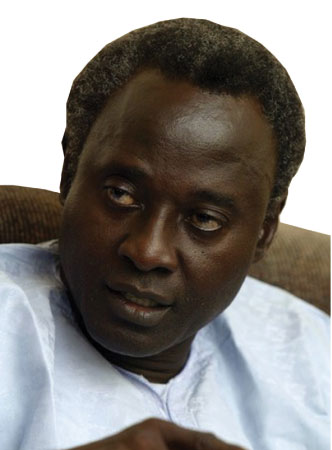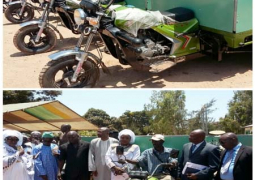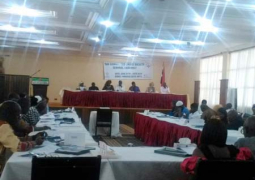
Seven political parties in The Gambia have called for the postponement of the scheduled National Assembly Election, citing what they said was the delay by the Independent Electoral Commission (IEC) to meet the opposition to discuss how to put the right conditions in place for genuine elections.
However, the IEC “categorically stands by this date, and the National Assembly Election will be held as planned” on the 29th March 2012, according to a letter dated 5 March in which the commission responded to the opposition’s demands.
Leaders from the opposition Peoples Democratic Organisation for Independence and Socialism (PDOIS), National Reconciliation Party (NRP), United Democratic Party (UDP), Gambia Party for Democracy and Development (GPDP), Gambia Moral Congress (GMC, National Alliance for Democracy and Development (NADD) and Peoples Progressive Party (PPP) yesterday met at the Peoples Centre in Churchill’s Town, where they held a press conference and made the call.
The move stemmed from a number of issues presented to the IEC by members of the opposition parties, which they wanted the IEC to address, before the polls slated for 29th March 2012.
Among their demands, the opposition called on the IEC to address issues relating to the use of state resources during campaign periods, involvement of regional governors and chiefs, as well as media bias during elections.
Speaking on behalf of his colleagues at the press conference, Halifa Sallah of the PDOIS said the greatest threat to the building of a genuine electoral system is abuse of incumbency and the complete merger between party and state that enables the ruling APRC party to exercise a monopoly over state resources and the media, and their utilisation to its political advantage.
Sallah told journalists that even though it is incontrovertible that elections are designed to enable the enfranchised citizenry to listen to the candidates and elect their persons of choice, in The Gambia public elections are transformed into a battle between opposition candidates and the state.
“ APRC candidates are accompanied by ministers, governors, chiefs, council of elders, village heads, paramilitary personnel, ambulance drivers, green boys and girls and local government authorities boardinggovernment and local government vehicles, ambulances, military trucks to form convoys that are given clout of state authority, when they ply in and out of villages,” Sallah observed.
Elections, he said, should be a contest between equals, where the state is neutral and provides resources and personnel to secure the vote, and ensure a free atmosphere for the conduct of a fair exercise of the franchise.
He noted that despite the expression of their wish for genuine elections, over the years, the utilisation of state resources and the media to expand and consolidate the supremacy of ruling party has even been extended to promote a monarchical political culture in gross subversion of the Republican Constitution.
“The opposition has been pushed into a vicious corner, to either boycott and be damned or participate in elections and be damned, and caught in this loss-loss situation; it would be disingenuous to continue to contest every election with our hands and feet tied, and then come out complaining of electoral misconduct,” he stated.
Meanwhile, the IEC has responded to the “demand for a level ground for multiparty contest in The Gambia to prevent political exclusion”, made by the opposition parties, in a letter they submitted to the national electoral commission recently.
The IEC’s response was contained in a letter dated 5th March 2012, which was addressed to the APRC, NADD, UDP, PDOIS, NRP, GPDP, GMC and PPP all political parties in The Gambia.
The IEC said, following the opposition demands, it convened an emergency meeting “whose sole purpose was to discuss expeditiously and judiciously the concerns raised by the opposition parties.”
The IEC added that the meeting resolved as follows: “To implement the following, cognisant of the fact that democracy is a process, and the Commission should always, as is expected of it by constitutional dictates, promote a free, fair and transparent electoral process, and in so doing persevere to facilitate a levelling of the playing field for all stakeholders in the process.”
Among others, the IEC said, “on the issue of the use of state resources”, it has been quite pro-active, having just concluded a countrywide tour to sensitize local authorities on the dos and don’ts as far as elections are concerned. “Laws are very clear on separation of party and state”, the IEC declared, adding that the commission will continue to sensitize the nation on this issue, “and will write a letter to the Minister of Local Government highlighting this issue.”
The IEC said it will convene a meeting with all security heads to discuss all matters relating to the level of participation expected from the security forces in order for them to positively impact on the forthcoming elections.”
The IEC said it will set up monitoring teams, to ensure there is no campaigning in any form, on the day before Election Day, which is a “cooling off day”; and asked all stakeholders to do their own monitoring and report any infringement to the commission, which promised to “take punitive measures against anyone found contravening this policy”.
The IEC said it will ensure equal access is given to all contesting parties during the official campaign period. “All contesting parties including independent candidates will be given the opportunity to be heard on public radio and where possible public television.” It added: “The commission will activate a media monitoring unit to monitor the airwaves on behalf of the commission, and report any infringement of the code of campaign ethics to the commission for swift action”.
The IEC also stated that it has sworn to protect the laws of the
The commission added that it will “proactively act on any contraventions of the law”, but asks that complaints in writing be made to the IEC, when there is evidence of a contravention.



